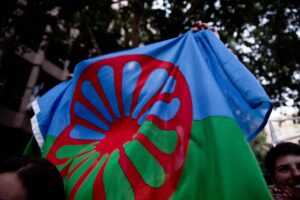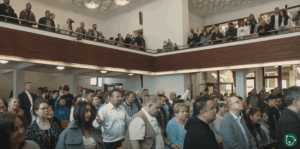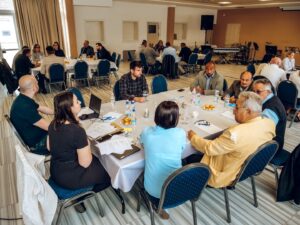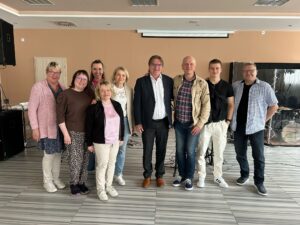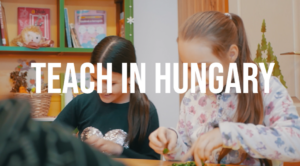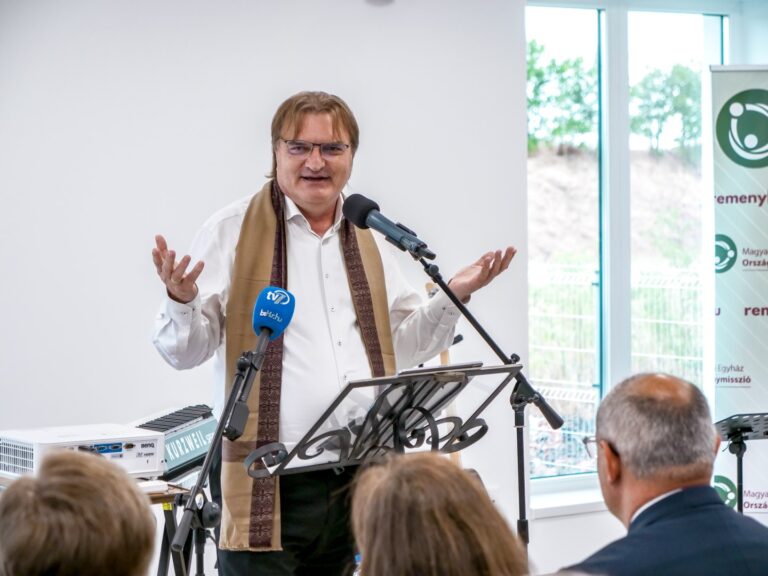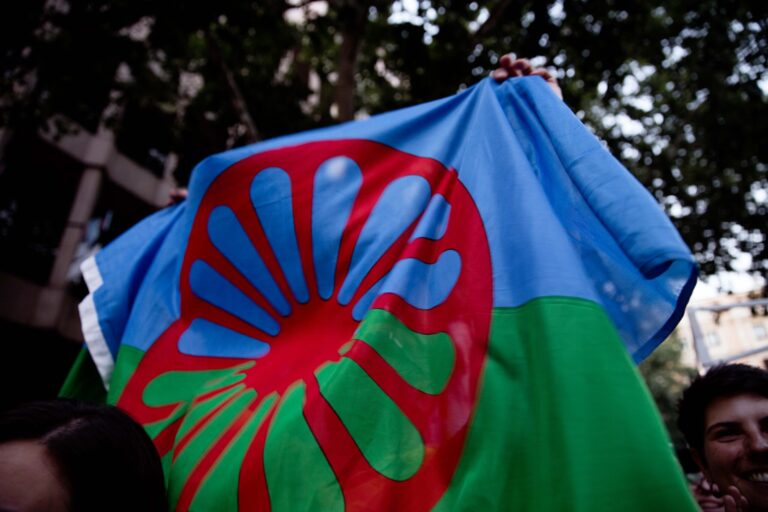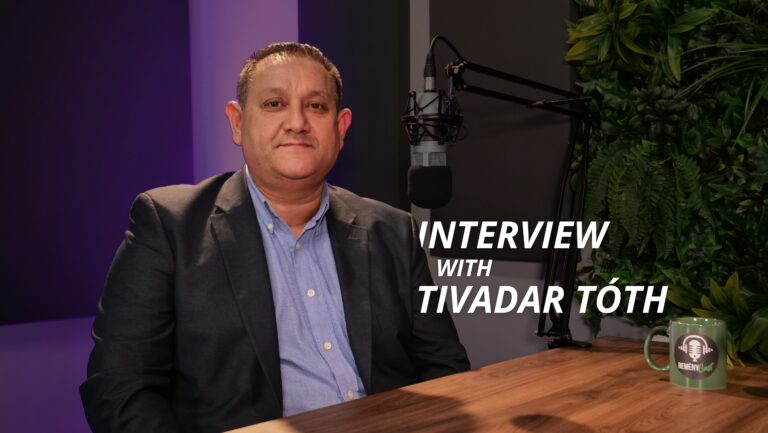Hungarian Gypsy Missions International, through its Charity division, has been continuously helping families displaced by the Russian-Ukrainian war. They also organize aid for those who remain in their homes. This inspired us to reach out to a Hungarian refugee from Subcarpathia (Kárpátalja), who lives his everyday life in Békés with the support of the HGMI. József Balogh, a 21-year-old from an illiterate Roma family, shared his experiences. Read on to learn how he is doing, what the mission’s support means to him, and what his hopes are.
Where did you come from to Hungary, and what kind of family do you come from?
We came from Tiszaújlak, Subcarpathia. I grew up in a poor family where my parents did everything they could to provide for us. It was harder for me than for other kids—I saw them with bikes and phones, but we couldn’t afford such things. However, my parents always explained what we could afford, and I understood that.
Did your parents work?
Yes, my father worked abroad and was away for months at a time. Even though life is cheaper back home, his income alone wasn’t enough. We were in a difficult situation because one salary wasn’t enough to support the family.
Did you attend school in Subcarpathia?
Yes, I did, and it was very important to me because neither my father nor my mother could read or write. I was at a disadvantage compared to the other kids whose parents could help them. I tried my best to catch up, and by the second or third grade, I could read, write, and do math. Although it was hard, especially because I felt ashamed, my relatives helped me since they were ahead of me in school.
A significant decision was made in your life when the war broke out in Ukraine. How did this affect you?
It had a dual effect. On the one hand, it was a blessing, but on the other hand, it was very difficult. Those who left Ukraine had to abandon everything they had built up over their lives. Everything they had worked for was gone in an instant.
Did it have to be this way? Did you ever consider staying when the war broke out?
Some people stayed because they felt their situation was still acceptable. But we couldn’t afford to stay. For us, there was no other option; we had to leave.
For those who stayed, was it dependent on how much money they had? How did money help them?
In Subcarpathia, money can solve many problems, but not everyone has enough of it. Some people stayed because they didn’t want to leave the country they were born and raised in, even if they had no financial help. Their lives were no longer in their control, and they couldn’t know when the end would come.
What do you mean when you say that in Subcarpathia, money can solve everything?
In Subcarpathia, if someone had money, they could buy almost anything. For example, a poor woman about to give birth might end up on the street if she had no money. But if she paid 2-3 thousand forints, suddenly everything was fine, and it no longer mattered that she was Roma. Money was essential to receive the same services as non-Roma people.
Did you have information about the war in advance?
Yes, we did. My godfather warned us in time that it would be wise to leave because big problems were expected. He said that when they started drafting people in large numbers, money wouldn’t matter anymore. The state would turn everyone into soldiers, regardless of their personal situation.
Why did you choose Hungary as your destination?
Hungary was the simplest and closest choice. While Romania, Germany, and other countries were options, the language barriers would have made it difficult to settle there. Plus, we had long wanted to move to Hungary. Here, we didn’t have to worry about language difficulties.
When you crossed the border, where did you go?
We had worked in Budapest before the war, and my mom and others crossed the border at Tiszabecs. There, Pastor Attila Páter gave us significant help. He provided hot meals, shelter, and handled necessary matters, even using his own money. Although we had some money, it wasn’t enough for housing or major expenses.
Were you unable to find a long-term solution in Szabolcs County? How did the uncertainty affect you?
In Szabolcs County, we couldn’t secure independent housing or long-term livelihoods due to a lack of money and job opportunities. The uncertainty weighed on me, especially because I worried about my family’s future. Although I could have endured living on the streets, my priority was ensuring my family’s safety. Attila Páter offered to help us, and we moved to the mission, where our situation became more secure.
What kind of change did living at the mission bring to your life?
Living here brought significant changes. My younger sister and I began studying. I started a hairdressing program, but I had to pause my studies due to issues related to Hungarian citizenship. I hope to continue next year, as the process is already underway. Becoming a hairdresser has been a long-time dream of mine. I want to show my family that I’ve achieved something. Although starting from scratch is difficult, I believe that with the Lord’s help, it’s possible.
How is your relationship with the locals in Békés? Have they accepted you?
Yes, they have accepted us. We’ve met many kind people. Young people don’t always accept newcomers easily, but I understand that. While we occasionally see each other, I haven’t formed close friendships yet, as I didn’t grow up here. I still feel like a guest in this place.
Do you see your stay in Hungary as temporary?
Initially, we considered it temporary because we wanted to return home. But now we see that our country won’t be the same as before. The war and political situation have changed everything. I don’t want my family, especially my sisters, to be in danger, so we’ve decided to stay here where we are safe.
What does God mean to you?
The Lord is my personal savior. I have complete trust in Him, and He determines my future. I’ve always believed in the Lord, but I got to know Him better at Attila Páter’s place in Tiszabecs. Through the congregation, I encountered the deeper meaning of the Lord. I now understand how the Lord can bring good out of even the worst situations. He shows happiness and love through hardships. That’s when I accepted Him as my personal savior.
What is your testimony?
My testimony is that knowing the Lord brought significant change to my life. Back home, job opportunities were limited, and we sometimes resorted to smuggling or other bad things to survive. But after getting to know the Lord, that changed. I’ve found it easier to let go of those problems, and I’ve learned that life’s quality isn’t determined by how much money you have. Now, it’s enough for me to earn 10,000 forints a day because I can live in peace with that.
How has the mission helped your family?
The mission has helped a lot. It provided housing, food, medical assistance, and supported my education. The people encouraged me to move forward. Although adapting to new worship styles was initially hard, I realized that I wasn’t there for the worship or the people, but to grow closer to the Lord.
What are your future plans, and how do you plan to become independent?
Our plan is to get our own home. We’re considering staying in Békés, but finding job opportunities is challenging. I’m the only one earning an income, as my parents and other family members don’t have professions. Although they try to work, I don’t fully trust outside employers, so I try to provide for the family myself.
Looking back, do you think it was worth leaving your country?
In some ways, yes. Although my parents still mourn leaving behind everything they built, the future isn’t there anymore. The Lord has shown us a better path, where there is no fear or pain, and what He has promised, He will fulfill.





